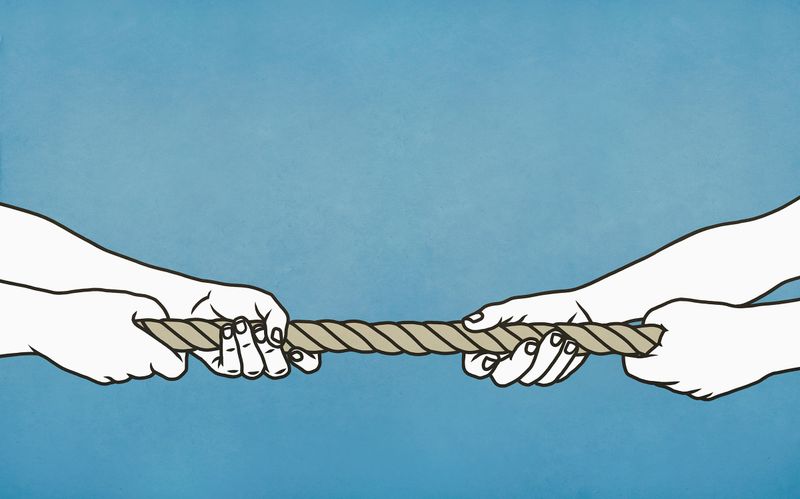Being in a relationship is work. Not the “ugh, this is exhausting” kind (though… sometimes), but the intentional, uncomfortable, deeply rewarding kind of work that demands self-awareness, accountability, and a whole lot of humility. Love doesn’t simply run on autopilot.
And let’s be real: sometimes the problem isn’t your partner—it’s you. That truth? It stings. But guess what? It also sets you free. When you finally own your part in the mess (and the magic), you unlock the power to change things for the better.
Get ready for some real talk and a few hard truths—plus the hopeful, healing shifts that come next. If you’re ready to grow, laugh at yourself, and maybe send this to a friend when it hits too close to home, you’re in the right place.
1. Good intentions aren’t magic erasers
Ever had the best of intentions and still ended up hurting someone? Story of my life. Meaning well is sweet, but it doesn’t cancel out the harm if your actions sting—no matter how pure your heart was in the moment.
I used to defend myself with, “I didn’t mean it like that!” But honestly, intent doesn’t erase impact. Facing up to the pain you caused, even when it wasn’t on purpose, is real maturity.
Learning to listen when someone says they’re hurt, and not rushing to justify yourself, is where growth happens. The brave move is to get curious, not defensive. That’s when real change gets a foothold.
2. Love can’t fix your messy conversations
I used to think love was enough to magically smooth out every awkward, heated, or silent conversation. Turns out, awkward silences and raised voices are not special effects of deep connection—they’re signals.
Love is not a communication superpower. You actually have to learn to talk and listen in ways that don’t set each other on fire. Skills, not feelings, turn conflict into connection.
And when you slip up (because, hello, you will), owning it with an honest, “I messed that up,” is a million times more attractive than pretending it didn’t happen. Communication is a muscle. Use it, or lose it.
3. Emotional walls aren’t cute (or invisible)
There’s nothing quite like realizing you’re the one who won’t let anyone in. I spent months thinking I was just ‘private’—but really, I was emotivamente non disponibile and didn’t even see it.
If the idea of sharing your feelings makes you squirm, it’s time to pause. Sometimes we armor up so much, nobody—even someone we love—can get through. Vulnerability is terrifying but also the gateway to real closeness.
Start small. Admit you feel weird. Ask yourself why being open feels so risky. The walls you build might keep pain out for a minute, but they also block the good stuff: intimacy, laughter, and those mushy moments only love delivers.
4. Defensiveness is not the flex you think it is
Raise your hand if you’ve ever turned a simple comment into a full-on debate because you felt attacked. Yep, me too. Defensiveness feels like protecting your heart, but it actually pushes people away.
What if, instead of shutting down or clapping back, you paused and thought, “Is there any truth in what they’re saying?” It’s hard, trust me. But it can be enlightening.
The shift isn’t about rolling over; it’s about listening for what’s real. Sometimes, the most loving thing you can do for yourself (and your partner) is to drop the armor for a second and genuinely consider their point of view.
5. Love isn’t a hall pass for harm
You can adore someone and still hurt them over and over. That was a tough pill to swallow for me. It’s easy to believe our feelings somehow excuse the sharp words or cold shoulders we dish out.
But love is more than a warm, fuzzy feeling—it’s measured by actions. If you keep repeating behaviors that cause pain, no amount of “I love you” makes it okay.
Accountability isn’t the enemy of love; it’s the proof. The couples who work through pain together know love isn’t just about feelings—it’s about the way you choose to show up, especially after you’ve messed up.
6. Your past is not your partner’s fault
Trauma is heavy. It shapes us, sometimes in ways we don’t even recognize. But dragging it into every argument? Not fair to anyone.
I used to lean on my wounds as an explanation for every outburst or shutdown. But here’s the catch: your history is real, but it’s not a permission slip for bad behavior. Healing is your responsibility.
If you want healthy love, break the cycle instead of repeating it. Therapy, journaling, honest conversations—it all counts. Your partner can support you, but they can’t do the work for you. Be brave enough to begin.
7. “That’s just how I am” is a cop-out
I’ve played the “that’s just me” card more times than I care to admit. Authenticity is great, but using it as an excuse to stay stuck? Not so much.
Real talk: refusing to change because you want to be ‘authentic’ is just emotional laziness in disguise. Growing, shifting, and learning doesn’t make you fake—it means you’re leveling up.
You’re allowed to let go of old patterns that don’t serve you anymore. Who you were yesterday doesn’t have to be who you are tomorrow. Authenticity is about becoming your best self, not staying the same out of stubbornness.
8. You probably interrupt more than you think
Ever been called out for interrupting and thought, “Wait, do I really do that?” Newsflash: most of us do it way more than we notice. I cringe thinking about all the moments I jumped in too soon.
Interrupting, invalidating, or dismissing someone’s words (even accidentally) chips away at trust and intimacy. Practicing reflective listening feels awkward at first, but it’s a game-changer.
Try: “What I hear you saying is…” Let them finish. Repeat their words back. It feels mechanical at first, but the payoff is huge. Relationships grow stronger when people feel truly heard—even during uncomfortable chats.
9. Needing to be right is exhausting (and lonely)
Confession: I used to argue like I was collecting medals. Winning felt so good—until I realized it cost me closeness every single time. The need to be right can leave you isolated, even when you technically “win.”
The real question isn’t, “Am I right?” It’s, “Do I want to connect, or do I want to conquer?”
Letting go of the need to win means making space for connection. Sometimes, putting down your sword is the bravest thing you can do. It’s not about losing; it’s about gaining intimacy with your partner, which is way more satisfying.
10. Your delivery matters—way more than you think
You can be right, absolutely brilliant, and still come off as harsh if your delivery is off. I learned this the hard way—logic doesn’t matter if it feels like an attack.
The way we say things—our tone, timing, and body language—matters more than we admit. It’s the delivery that makes or breaks a conversation. If you want to connect, lead with warmth instead of just facts.
Empathy turns explanations into invitations. Soften your approach. Take a breath before you talk. Your words will land better, and your partner will actually want to hear you out.
11. Sorry means nothing without change
I used to think saying “sorry” fixed everything. Spoiler: it doesn’t. A real apology is only as meaningful as the actions that follow it.
If nothing changes, your words are just noise. Turning an apology into a turning point isn’t easy—it takes follow-through and a willingness to do better, not just say better.
People want to see you care enough to put in the effort. Let your apology be the start, not the end. Make it count by backing it up with real, visible changes. That’s how trust is rebuilt.
12. Are you quick to react, slow to reflect?
Raise your hand if you’ve ever blurted out something you instantly regretted. Guilty as charged. Reacting is easy; reflecting is a skill.
It’s tempting to fire off a snarky comeback or go silent, but most conflicts are about something deeper than the immediate spark. Slowing down helps you find out what’s actually going on beneath the surface.
Feel the feeling, then get curious about it. Ask yourself, “What’s really bothering me?” That simple pause can save you—and your relationship—a world of heartache.
13. Your partner isn’t your emotional janitor
It took me years to realize my partner wasn’t put on earth to fix my bad moods or clean up my emotional messes. Sharing feelings is human; expecting someone else to regulate them? Not so much.
Emotional maturity means managing your own storms. It’s okay to let your partner in on how you feel, but don’t hand them the mop every time you spill.
Growth looks like saying, “I’m upset, but I don’t expect you to fix this.” It’s freeing for both of you. Let your partner support you, not save you.
14. Intent versus impact: the classic trap
So many fights start with, “That’s not what I meant!” I’ve been there more times than I can count. But intent doesn’t magically erase the pain your words or actions caused.
It’s tempting to argue about what you meant, but what really matters is how it landed. Empathy is the missing ingredient. Try, “I can see how that hurt you, and I’m sorry. Let me do better.”
It’s not about groveling—it’s about putting your partner’s experience at the center for a second. That’s how you move forward together, instead of spinning your wheels.
15. Humor as a shield? Guilty.
I’m the queen of using humor to dodge the hard stuff. If I can make you laugh, maybe we don’t have to talk about what’s really going on, right? Plot twist: humor is not a substitute for vulnerability.
Behind every sarcastic jab is often a pile of feelings we’re afraid to show. The bravest thing? Drop the joke and say what’s really on your heart.
Vulnerability is scarier than being witty, but it’s far more rewarding. Let your partner see the real you, not just the clown. Sometimes, the best punchline is honesty.
16. Are you really chill, or just hiding?
For years, I prided myself on being the ‘chill’ girlfriend—never causing drama, never making a fuss. But secretly, I was just avoiding the hard conversations.
Being easygoing is great, but not if it means swallowing your feelings until they turn into resentment. Emotional honesty beats bottling up every day of the week.
Check in with yourself: are you really okay, or just afraid of being ‘too much’? You deserve a relationship where you can be messy, loud, and real. Trust me, it’s a relief to let your true self out.
17. You might not know how to receive love
I thought I was a pro at loving—always giving, always showing up. But when it came to receiving love, I froze. Accepting care can feel vulnerable, almost uncomfortable if you’re used to being the giver.
Learning to let yourself be cared for is its own kind of bravery. It means letting go of control and allowing someone else’s affection to land. It’s awkward, but it’s beautiful.
Remember, receiving is just as important as giving. Let love in. Practice saying “thank you” instead of “you shouldn’t have.” You’ll both feel closer for it.
18. Safety is the real love language
If your relationship feels like a battlefield, it’s impossible to truly connect. Defensive energy turns every small conflict into a big deal.
True safety comes from knowing your flaws won’t be weaponized against you. When you show up as a safe place, your partner is more likely to relax and show their true self.
Make your relationship a space where mistakes aren’t fatal. It’s not about perfection; it’s about being able to mess up and still be loved. That’s where real intimacy grows.
19. Messing up is part of the package
Perfection is overrated. Every couple I know—yes, even the ones who seem flawless on Instagram—mess up, sometimes spectacularly. The magic isn’t in never failing; it’s in how you come back together after the fact.
Repair is sacred. The relationships that last aren’t built on spotless records, but on the willingness to say, “Let’s try again.”
So when you mess up (because you will), don’t panic. Own it, fix it, and keep moving. Love isn’t about getting it right every time—it’s about refusing to quit on each other, no matter what.




















